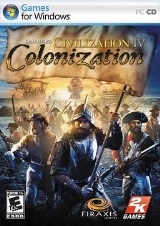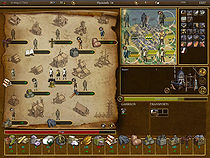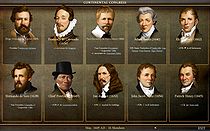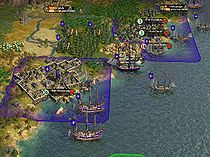
Civilization IV: Colonization
Encyclopedia
Sid Meier's Civilization IV: Colonization is a remake (a total conversion using Sid Meier's Civilization IV
engine) of the 1994 turn-based strategy
game Sid Meier's Colonization. Players control settlers from one of four European nations, Spain
, England
, France
, or the Netherlands
, that are trying to conquer/colonize the New World
in the time period between 1492–1792. The final goal of each player is to build up their colonies and a standing army, then declare independence
from their mother country and defeat the military force that the King sends to crush the rebellion.
The Windows version was released on September 22, 2008. A Mac OS X
version was released in January 2010. Sid Meier's Civilization IV: Colonization does not require the original Sid Meier's Civilization IV
in order to play.
 In order to build and expand their cities, players must balance negotiations with several separate groups: the natives
In order to build and expand their cities, players must balance negotiations with several separate groups: the natives
of the Americas, colonists from the player's home country, and other colonists from the old world
. Players may also recruit founding fathers to join their cause — each with a specific bonus that helps them throughout the game. The player influences the direction of his colony through his choices in diplomacy, recruitment, and city management. Additional colonists from Europe or converted natives can result in population increases after food surpluses exceed a preset level.
Economics and trade come into play when the player makes finished goods and sells them in Europe, or trades with the natives for other goods or gold. By harvesting natural resources, skilled craftsmen can convert them into finished goods for sale or trade. Additionally, silver can be mined for direct trade, and ore can be mined to turn into tools and then in turn guns. Skilled craftsmen produce twice as much as regular workers, and specialist buildings can be built to increase overall production as well.
The player's selection of nationality, made at the start of the game, affects the colony's standing in the world: The English receive an immigration bonus, while the Dutch enjoy trade bonuses. The French diplomacy edge encourages more favorable relations with native tribes, while the Spanish Conquistador
bonus favors conquest against the natives.
In addition to single-player campaigns, the new game has a multiplayer component.
 In addition to updated graphics engine and a multiplayer segment, Civilization IV: Colonization has many new gameplay mechanics. When starting the game, in addition to choosing a starting European nation, a player chooses between two governor
In addition to updated graphics engine and a multiplayer segment, Civilization IV: Colonization has many new gameplay mechanics. When starting the game, in addition to choosing a starting European nation, a player chooses between two governor
s, each with different advantages. In addition, national borders is a gameplay concept taken from Civilization IV. This means that rivals cannot pass into each other's land unless they have an open borders agreement — or they have declared war.
Unlike the original game, nations cannot recruit the same founding fathers. Each founding father is recruited by one and only one nation/player. Moreover, founding fathers will only join nations with certain criteria, namely a certain level of "points" obtained in various categories (political, military, exploration, religion, and trade).
After the player declares independence, players draft a constitution
determining the government style of their independent nation. For example, if a nation chooses a monarchical
system, then it can still trade with Europe during the war for independence.
Additionally, there are no longer any Loyalist victories.
 The single victory condition – declaring and winning a war for independence – has been both criticized and accepted by reviewers. Another criticism of the game is that it only has four playable colonial powers. The exclusion of Europe's less prominent colonial powers has been called a "limiting" factor in the game.
The single victory condition – declaring and winning a war for independence – has been both criticized and accepted by reviewers. Another criticism of the game is that it only has four playable colonial powers. The exclusion of Europe's less prominent colonial powers has been called a "limiting" factor in the game.
Variety
video games reporter and reviews editor Ben Fritz criticized the concept of the game in his blog because of the injustices that occurred during the colonial time period. Firaxis has responded to Fritz's blog post with the statement, "the game does not endorse any particular position or strategy - players can and should make their own moral judgments."
Civilization IV
Sid Meier's Civilization IV is a turn-based strategy, 4X computer game released in 2005 and developed by lead designer Soren Johnson under the direction of Sid Meier and Meier's studio Firaxis Games. It is the fourth installment of the Civilization series...
engine) of the 1994 turn-based strategy
Turn-based strategy
A turn-based strategy game is a strategy game where players take turns when playing...
game Sid Meier's Colonization. Players control settlers from one of four European nations, Spain
Spanish Empire
The Spanish Empire comprised territories and colonies administered directly by Spain in Europe, in America, Africa, Asia and Oceania. It originated during the Age of Exploration and was therefore one of the first global empires. At the time of Habsburgs, Spain reached the peak of its world power....
, England
Kingdom of England
The Kingdom of England was, from 927 to 1707, a sovereign state to the northwest of continental Europe. At its height, the Kingdom of England spanned the southern two-thirds of the island of Great Britain and several smaller outlying islands; what today comprises the legal jurisdiction of England...
, France
Early Modern France
Kingdom of France is the early modern period of French history from the end of the 15th century to the end of the 18th century...
, or the Netherlands
United Netherlands
United Netherlands is an educational student-led organization that focuses on the theory and practice of international relations and diplomacy...
, that are trying to conquer/colonize the New World
New World
The New World is one of the names used for the Western Hemisphere, specifically America and sometimes Oceania . The term originated in the late 15th century, when America had been recently discovered by European explorers, expanding the geographical horizon of the people of the European middle...
in the time period between 1492–1792. The final goal of each player is to build up their colonies and a standing army, then declare independence
Independence
Independence is a condition of a nation, country, or state in which its residents and population, or some portion thereof, exercise self-government, and usually sovereignty, over its territory....
from their mother country and defeat the military force that the King sends to crush the rebellion.
The Windows version was released on September 22, 2008. A Mac OS X
Mac OS X
Mac OS X is a series of Unix-based operating systems and graphical user interfaces developed, marketed, and sold by Apple Inc. Since 2002, has been included with all new Macintosh computer systems...
version was released in January 2010. Sid Meier's Civilization IV: Colonization does not require the original Sid Meier's Civilization IV
Civilization IV
Sid Meier's Civilization IV is a turn-based strategy, 4X computer game released in 2005 and developed by lead designer Soren Johnson under the direction of Sid Meier and Meier's studio Firaxis Games. It is the fourth installment of the Civilization series...
in order to play.
Gameplay

Indigenous peoples of the Americas
The indigenous peoples of the Americas are the pre-Columbian inhabitants of North and South America, their descendants and other ethnic groups who are identified with those peoples. Indigenous peoples are known in Canada as Aboriginal peoples, and in the United States as Native Americans...
of the Americas, colonists from the player's home country, and other colonists from the old world
Old World
The Old World consists of those parts of the world known to classical antiquity and the European Middle Ages. It is used in the context of, and contrast with, the "New World" ....
. Players may also recruit founding fathers to join their cause — each with a specific bonus that helps them throughout the game. The player influences the direction of his colony through his choices in diplomacy, recruitment, and city management. Additional colonists from Europe or converted natives can result in population increases after food surpluses exceed a preset level.
Economics and trade come into play when the player makes finished goods and sells them in Europe, or trades with the natives for other goods or gold. By harvesting natural resources, skilled craftsmen can convert them into finished goods for sale or trade. Additionally, silver can be mined for direct trade, and ore can be mined to turn into tools and then in turn guns. Skilled craftsmen produce twice as much as regular workers, and specialist buildings can be built to increase overall production as well.
| Colony | Leader(s) | Capital |
| New England New England Colonies The New England Colonies of British America included the colonies of Massachusetts Bay Colony, Connecticut Colony, Colony of Rhode Island and Providence Plantations and Province of New Hampshire. They were part of the Thirteen Colonies including the Middle Colonies and the Southern Colonies. These... |
John Adams John Adams John Adams was an American lawyer, statesman, diplomat and political theorist. A leading champion of independence in 1776, he was the second President of the United States... , George Washington George Washington George Washington was the dominant military and political leader of the new United States of America from 1775 to 1799. He led the American victory over Great Britain in the American Revolutionary War as commander-in-chief of the Continental Army from 1775 to 1783, and presided over the writing of... |
Jamestown Jamestown, Virginia Jamestown was a settlement in the Colony of Virginia. Established by the Virginia Company of London as "James Fort" on May 14, 1607 , it was the first permanent English settlement in what is now the United States, following several earlier failed attempts, including the Lost Colony of Roanoke... |
| New France New France New France was the area colonized by France in North America during a period beginning with the exploration of the Saint Lawrence River by Jacques Cartier in 1534 and ending with the cession of New France to Spain and Great Britain in 1763... |
Samuel de Champlain Samuel de Champlain Samuel de Champlain , "The Father of New France", was a French navigator, cartographer, draughtsman, soldier, explorer, geographer, ethnologist, diplomat, and chronicler. He founded New France and Quebec City on July 3, 1608.... , Louis de Frontenac Louis de Buade de Frontenac Louis de Buade, Comte de Frontenac et de Palluau was a French soldier, courtier, and Governor General of New France from 1672 to 1682 and from 1689 to his death in 1698... |
Quebec Quebec City Quebec , also Québec, Quebec City or Québec City is the capital of the Canadian province of Quebec and is located within the Capitale-Nationale region. It is the second most populous city in Quebec after Montreal, which is about to the southwest... |
| New Netherland New Netherland New Netherland, or Nieuw-Nederland in Dutch, was the 17th-century colonial province of the Republic of the Seven United Netherlands on the East Coast of North America. The claimed territories were the lands from the Delmarva Peninsula to extreme southwestern Cape Cod... s |
Adriaen van der Donck Adriaen van der Donck Adriaen Cornelissen van der Donck was a lawyer and landowner in New Netherland after whose honorific Jonkheer the city of Yonkers, New York is named... , Peter Stuyvesant Peter Stuyvesant Peter Stuyvesant , served as the last Dutch Director-General of the colony of New Netherland from 1647 until it was ceded provisionally to the English in 1664, after which it was renamed New York... |
New Amsterdam New Amsterdam New Amsterdam was a 17th-century Dutch colonial settlement that served as the capital of New Netherland. It later became New York City.... |
| New Spain New Spain New Spain, formally called the Viceroyalty of New Spain , was a viceroyalty of the Spanish colonial empire, comprising primarily territories in what was known then as 'América Septentrional' or North America. Its capital was Mexico City, formerly Tenochtitlan, capital of the Aztec Empire... |
Simón Bolívar Simón Bolívar Simón José Antonio de la Santísima Trinidad Bolívar y Palacios Ponte y Yeiter, commonly known as Simón Bolívar was a Venezuelan military and political leader... , José de San Martín José de San Martín José Francisco de San Martín, known simply as Don José de San Martín , was an Argentine general and the prime leader of the southern part of South America's successful struggle for independence from Spain.Born in Yapeyú, Corrientes , he left his mother country at the... |
Isabella |
| Good | Resource | Harvester | Worker | Building | Terrain |
| Cigar Cigar A cigar is a tightly-rolled bundle of dried and fermented tobacco that is ignited so that its smoke may be drawn into the mouth. Cigar tobacco is grown in significant quantities in Brazil, Cameroon, Cuba, the Dominican Republic, Honduras, Indonesia, Mexico, Nicaragua, Philippines, and the Eastern... s |
Tobacco Tobacco Tobacco is an agricultural product processed from the leaves of plants in the genus Nicotiana. It can be consumed, used as a pesticide and, in the form of nicotine tartrate, used in some medicines... |
Tobacco Planter | Tobacconist History of tobacco Tobacco has a long history from its usages in the early Americas. It became increasingly popular with the arrival of the Europeans by whom it was heavily traded. Following the industrial revolution, cigarettes became popularized, which fostered yet another unparalleled increase in growth... |
Tobacco Shop | Grassland Grassland Grasslands are areas where the vegetation is dominated by grasses and other herbaceous plants . However, sedge and rush families can also be found. Grasslands occur naturally on all continents except Antarctica... |
| Cloth Textile A textile or cloth is a flexible woven material consisting of a network of natural or artificial fibres often referred to as thread or yarn. Yarn is produced by spinning raw fibres of wool, flax, cotton, or other material to produce long strands... |
Cotton Cotton Cotton is a soft, fluffy staple fiber that grows in a boll, or protective capsule, around the seeds of cotton plants of the genus Gossypium. The fiber is almost pure cellulose. The botanical purpose of cotton fiber is to aid in seed dispersal.... |
Cotton Planter | Weaver | Weaver's Shop | Prairie Prairie Prairies are considered part of the temperate grasslands, savannas, and shrublands biome by ecologists, based on similar temperate climates, moderate rainfall, and grasses, herbs, and shrubs, rather than trees, as the dominant vegetation type... |
| Coats Coat (clothing) A coat is a long garment worn by both men and women, for warmth or fashion. Coats typically have long sleeves and are open down the front, closing by means of buttons, zippers, hook-and-loop fasteners, toggles, a belt, or a combination of some of these... |
Furs | Fur Trapper | Fur Trader Fur trade The fur trade is a worldwide industry dealing in the acquisition and sale of animal fur. Since the establishment of world market for in the early modern period furs of boreal, polar and cold temperate mammalian animals have been the most valued... |
Fur Trading Post | Forest/Mixed Forest Forest A forest, also referred to as a wood or the woods, is an area with a high density of trees. As with cities, depending where you are in the world, what is considered a forest may vary significantly in size and have various classification according to how and what of the forest is composed... |
| Rum Rum Rum is a distilled alcoholic beverage made from sugarcane by-products such as molasses, or directly from sugarcane juice, by a process of fermentation and distillation. The distillate, a clear liquid, is then usually aged in oak barrels... |
Sugar Sugar Sugar is a class of edible crystalline carbohydrates, mainly sucrose, lactose, and fructose, characterized by a sweet flavor.Sucrose in its refined form primarily comes from sugar cane and sugar beet... |
Sugar Planter | Distiller Distillation Distillation is a method of separating mixtures based on differences in volatilities of components in a boiling liquid mixture. Distillation is a unit operation, or a physical separation process, and not a chemical reaction.... |
Rum Distillery | Marsh Marsh In geography, a marsh, or morass, is a type of wetland that is subject to frequent or continuous flood. Typically the water is shallow and features grasses, rushes, reeds, typhas, sedges, other herbaceous plants, and moss.... |
The player's selection of nationality, made at the start of the game, affects the colony's standing in the world: The English receive an immigration bonus, while the Dutch enjoy trade bonuses. The French diplomacy edge encourages more favorable relations with native tribes, while the Spanish Conquistador
Conquistador
Conquistadors were Spanish soldiers, explorers, and adventurers who brought much of the Americas under the control of Spain in the 15th to 16th centuries, following Europe's discovery of the New World by Christopher Columbus in 1492...
bonus favors conquest against the natives.
In addition to single-player campaigns, the new game has a multiplayer component.
Changes from Sid Meier's Colonization

Governor
A governor is a governing official, usually the executive of a non-sovereign level of government, ranking under the head of state...
s, each with different advantages. In addition, national borders is a gameplay concept taken from Civilization IV. This means that rivals cannot pass into each other's land unless they have an open borders agreement — or they have declared war.
Unlike the original game, nations cannot recruit the same founding fathers. Each founding father is recruited by one and only one nation/player. Moreover, founding fathers will only join nations with certain criteria, namely a certain level of "points" obtained in various categories (political, military, exploration, religion, and trade).
After the player declares independence, players draft a constitution
Constitution
A constitution is a set of fundamental principles or established precedents according to which a state or other organization is governed. These rules together make up, i.e. constitute, what the entity is...
determining the government style of their independent nation. For example, if a nation chooses a monarchical
Monarchy
A monarchy is a form of government in which the office of head of state is usually held until death or abdication and is often hereditary and includes a royal house. In some cases, the monarch is elected...
system, then it can still trade with Europe during the war for independence.
Additionally, there are no longer any Loyalist victories.
Engine
The game runs on an upgraded version of the Civilization IV engine with changes including enhanced graphics, streamlined code, and redesigned interfaces. With these enhancements, Colonization requires video cards that support pixel shader 1.1.Critical reception

Variety
Variety (magazine)
Variety is an American weekly entertainment-trade magazine founded in New York City, New York, in 1905 by Sime Silverman. With the rise of the importance of the motion-picture industry, Daily Variety, a daily edition based in Los Angeles, California, was founded by Silverman in 1933. In 1998, the...
video games reporter and reviews editor Ben Fritz criticized the concept of the game in his blog because of the injustices that occurred during the colonial time period. Firaxis has responded to Fritz's blog post with the statement, "the game does not endorse any particular position or strategy - players can and should make their own moral judgments."

